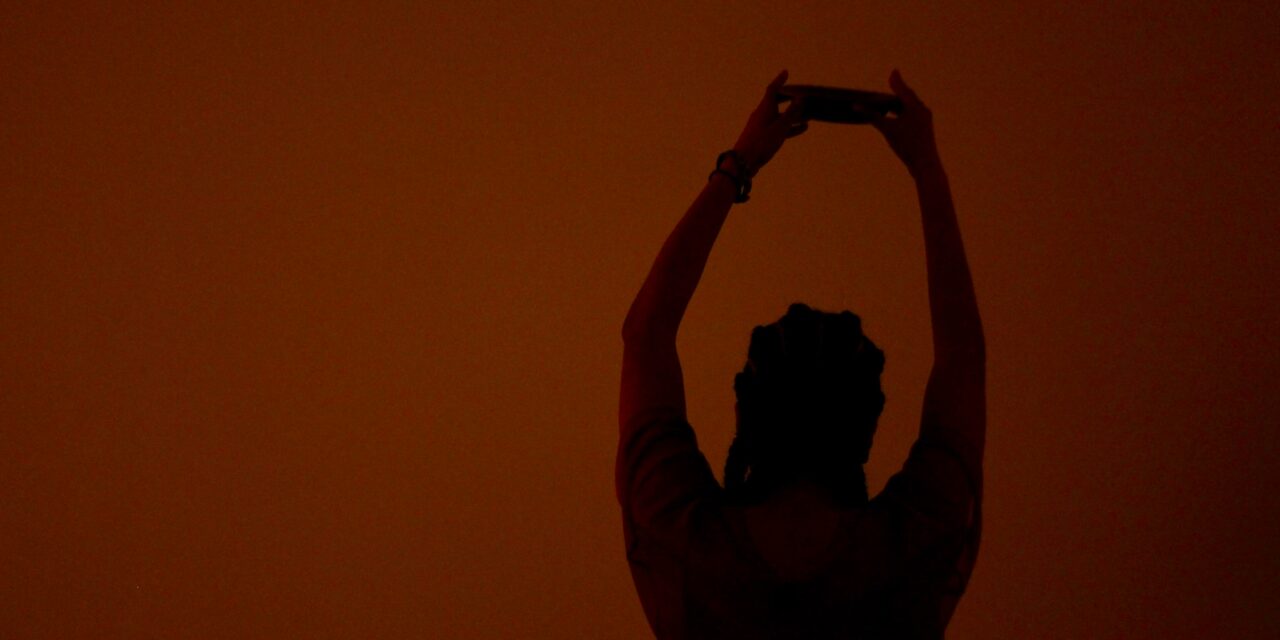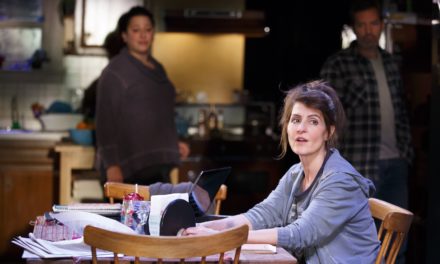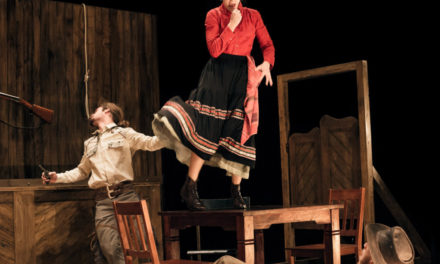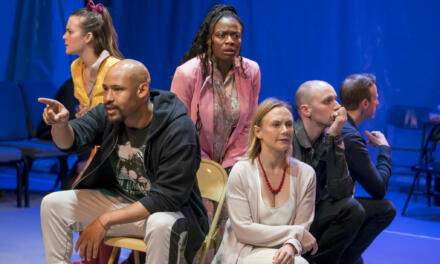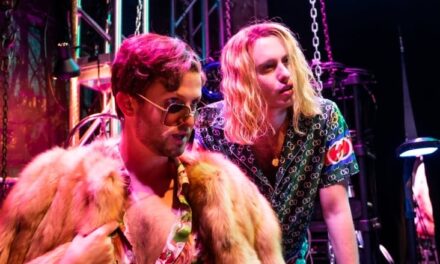In anticipation of their Afrofuturist event, Dreams in Black Major, being performed at the Ars Nova ANT Fest, I talked with Nia Farrell and Talia Paulette Oliveras about Dreams in Black Major, Afrofuturism, and being a multi-hyphenate artist in an academic setting.
NIA FARRELL: My name is Nia Farrell. I am an actor, writer, theatrical composer, and Afrofuturist. Um and… what was the next thing? Oh yeah, and I’m the writer of Dreams in Black Major.
Farrell just graduated from New York University’s Tisch School of the Arts with a BFA in Drama. At Tisch, she spent all four years training at the Experimental Theatre Wing (ETW).
TALIA PAULETTE OLIVERAS: I’m an actor, director, dramaturg; I primarily just collaborate on the development of any new theatrical work. And I’m directing Dreams in Black Major.
Oliveras also just graduated from NYU with a bachelor’s in Social and Cultural Analysis and a BFA in Drama. She completed the first two years of her training at the Playwrights Horizons Theatre School, then continued with her additional professional training at Stonestreet Studios Conservatory for Screen Acting & Production, in addition to two programs abroad: The International Theatre Workshop in Amsterdam, Netherlands and the Stanislavsky, Brecht and Beyond Program in Berlin, Germany.
LUCAS KERNAN: Do you guys want to talk a little bit about what exactly Dreams in Black Major is?
NF: Our little elevator pitch for the show: Dreams in Black Major is an Afrofuturist celebration of Blackness and actualization of dreams. It’s really a chance for Black people to come together and build a future that they wish for themselves.
LK: Can you talk a little bit about what Afrofuturism is, the goals and your influences regarding the movement and how it has played into your artistic practice?
NF: I think the Afrofuturism that we see a lot is the kind that’s in Black Panther, or from Sun Ra; the king that depends on this very far off scientific technology that we don’t have access to. But the Afrofuturism that I am really interested in is a reimagining of our histories and futures as Black people using the greatest resource we have–which is ourselves and our dreams. It’s this idea that the future is actually right in front of us; it’s just about creating active steps to get there, like building spaces for ourselves.
LK: I’ve heard you talk about the Mundane Afrofuturists, can you talk a little bit about how they have played into your development as an Afrofuturist?
NF: Yeah, I read the Mundane Afrofuturist Manifesto in my African-American Drama class, and it’s essentially this manifesto that was like, “We don’t believe Black people are aliens; we don’t believe that time travel brought us here; we are actually humans and we are complex humans.” So they lean into this idea of, like, contemporary dynamic Black humanity—that’s where all of their work starts.
TPO: And I would say that extends to Dreams in Black Major very literally in the duality between the vastness of dreams and the groundedness of the human body and the experience of being a Black person.
LK: Is there any particular significance in calling the piece an Afrofuturist event as opposed to a play or a piece of theatre?
NF: In writing it, I found that I don’t really write in linear plot forms; it’s a lot of circles, and what Talia found in directing this is that it feels more like a ritual than anything. There’s no climax. There’s no conflict. Those things are based in western ideas of theatre, and We don’t need to bring them inside our theatrical space because it’s already living within us, we can start from a place of dreaming and go from there.
TPO: Part of the discovery of how ritualistic the piece is just… it requires a certain kind of presence, I think, that you don’t often find in theatre, but I have found in ritual and spaces where I’m meditating. It’s a similar bodily experience to what I think the audience has when they experience this piece. And especially to the Black audience, that presence is something they are able to bring outside of the theatre space, which is why we find it important that its an event. But it continues beyond the walls of the theatre.
NF: Plays have such a finite ending where it’s like: the curtain comes down and then it’s over and, like, you kind of talk about it. But with our first iteration, we found that people were still bubbling about the show much long after we did it because it felt like a really good party that you went to and you just wanted to keep talking about it.
Farrell later made a point to define what the two mean when they say “Black audience.”
NF: When we say Black audience, we mean those who self-identify as Black, African, or Afro-Diasporic.
LK: Could you talk about the role of meditation in your company’s rehearsal process?
TPO: Yea. So something that is really important to me–and that has a lot to do with my entry point into Afrofuturism–has to do with the complexity of the Black experience being a bodily experience. Our bodies store things that we have quite literally experienced in our time on earth, but the history that is attached to our people is also stored in our bodies. And there’s something about meditation that allows for a deeper kind of “getting-in-touch” with what is being stored in your body that I think is really important. Just in my everyday life, it’s something that I do. But I found that in this space, it’s really helpful for all the actors to get in touch with themselves in order to, kind of, be able to do that work for the audience as well.
NF: What I love about Talia’s process is also, like, we are rehearsing in Playwrights and Tisch–and these are white institutions. And so we’ll read poetry and we’ll light incense, and it’s something about, just like, cleansing the space of what’s traditionally been and start fresh in making it our own Black space.
LK: When was the first moment of conceptualization for Dreams in Black Major and how long after that was it when you began devising the piece.
NF: It started in my self scripting class and I wrote it—I wrote like a series of dreams for the other two Black students who were in that class, and it was really a moment of like, “I want to write something that’s for them.” A piece that they can unequivocally relate to, and they don’t have to compromise any parts of themselves to understand it. And so like, in that class, I would just bring them over to a section of the room, do the piece for them, and then everyone else could either witness or hold the space—that kind of thing. From there I went to another self scripting class that had no other Black people. And that’s when I started writing the beginning of the piece–which is about, like, “What is it to code switch in these spaces?” and “How do I find my own Blackness in a space that doesn’t necessarily have that readily available?” Over the summer I kind of put all those pieces together and asked Talia to direct it, and it was really great to have other voices saying the text for the first time. Then following the reading, we finally decided this should be an Indie at ETW…
An Indie: referring to the Independent Project productions put on my upperclassmen in the Experimental Theatre Wing.
NF: and that’s when we first started staging and adding the movement and the music. And as I kept on going, things further kept getting realized about what is the Black experience–not just the words that we say, but it’s also, like, the way that we moved and the songs that we sang and the spaces that we hold.
LK: Talking about the later iterations of Dreams in Black Major and your partnership with the National Black Theatre in Harlem and now with Ars Nova, will you talk about how the piece—or if the piece–has changed, in terms of content, intention, audience, or otherwise?
TPO: Yeah, the piece is evolving quite significantly. Not necessarily in content, in terms of text or anything–it’s changing slightly in that regard–but something that we’re really discovering is our approach to the piece has changed. The National Black Theatre in Harlem offered a really wonderful opportunity where space already felt like ours, and we felt like the piece naturally fit into that space. We were able to lean into the dream aspects of the pieces, and the kind of, like, hopeful community aspects of the piece; whereas as we prepare for Ars Nova, the urgency of the piece has become really really apparent to us. Why this piece feels so important to us as artists and everyone who has worked on the piece is that there’s a certain, very tangible, strategic quality to the piece in terms of helping Black people discover how to make spaces for themselves and hold their dreams and create hope in spaces where that may not be already there for them–or definitely making it an obstacle for that to exist for them. We’re finding that now that the piece is going to be in a space that isn’t the National Black Theatre–it’s not an inherently Black space–we just have to be a lot more strategic and clear about how we do create that space for ourselves and for our community.
I later asked Oliveras about her time in Amsterdam and Berlin through NYU, and how those impacted her artistic practice.
TPO: Berlin was definitely the one that altered me the most, especially because I went to Berlin last spring, so at the time I went to Berlin, it was a really interesting—I mean it’s an interesting time politically in the world in general–but when I was there, it was right when the Alt-Right was really starting to rise in Berlin which is interesting because before I had gone everyone was like “Oh it’s such a progressive city… et cetera, et cetera…” And then I went there. I had this really complicated experience where I felt like all the theatre I was engaging with was aesthetically really in line with what I had been studying forever and what I had been seeing and engaging with forever, but the complicated conversations that I have here in New York with my peers about race and class and gender and things like that, I did not see at all in the city. And when I did try to have those conversations, especially about race, I was often met with just, really… just no one wanted to have the conversation!
NF: It wasn’t just, “We’re gonna be angry at you for it,” there was a little bit more hostility?
TPO: Yea, it was very passive-aggressive.
NF: It was like, “We don’t talk about this.” Because you literally don’t see any people of color.
TPO: Exactly. So it was really difficult, and I didn’t realize how difficult it was until the end of my time there when I actually met with a German director who’s Black. And I had a conversation with her, and she was the first person who actually engaged in a conversation on race with me. Suddenly I just had a very different outlook, and it became so much more apparent to me how important it is to have those conversations and how important it is to hold my body at the front of the work that I do because it is there and it needs to be spoken about.
LK: Did you have any personal—you mentioned the rising of the alt-right in Germany—did you have any personal experiences regarding that there? Like with your own safety or the safety of others that were in the program?
TPO: There was nothing direct in terms of, like, our safety necessarily being threatened. There were like protests happening, but a lot of it wasn’t directly in the center of Berlin where we were. It really boiled down to microaggressions in conversations–well I wouldn’t even call them microaggressions, to be honest. It just boiled down to the conversations we had. I remember one exact conversation with someone where we were discussing police brutality in America, and I was speaking to a white Swedish man as a Black woman of color. He was telling me I had less authority to speak on the issue because I haven’t read the studies that he’s read. It was this interesting thing that I had been coming across the whole time–they would intellectualize the issue and my lived experience was not enough to participate in the conversation. And that was specifically what really fascinated me about the experience being there because as someone who is an academic, you know, I also—my second major was Social and Cultural analysis—that was not enough for them. I am interested in what that says and how that exists in our country too.
LK: Does your vision for Dreams in Black Major take a step away from that intellectualization? Or does it look to fuse it with a more personal artistic experience?
TPO: I think it’s the fusion of the two. Like even in the last iteration that we did–in our program, for example, it was really important to us that we credited every single inspiration that came for the piece so like every book we’ve read—
NF: Right, it ended up drawing on a lot of theory, which you wouldn’t be able to tell in the text because it has a lot of poetry in it. For example, Audre Lorde’s biomythography. That was a huge thing for me, the idea of like, “Oh, I’m able to create my own future; I’m able to create my own history.” A fusion of biography and myth and storytelling.
TPO: “The Erotic as Power” from Audre Lorde as well–which was huge for me. That is a perfect essay that combines bodily experience with theory, and so we used a lot of that behind the scenes.
They’re referring here to two of Audre Lorde’s texts: her biomythographyZami: A New Spelling of My Name and her essay “Uses of the Erotic: The Erotic as Power” respectively.
NF: I think the reason why some of that theory isn’t so apparent in the play is that a lot of times academia is used as a class thing against Black people. And so it’s like, “No, no, no. We have that information. We also have ourselves.” They aren’t two separate things. The mind and the body aren’t separate.
LK: How did being in an academic community and environment during the creation of Dreams in Black Major effect the process?
NF: For me, I think the institution was a springboard. I was lucky to be in ETW because that community itself is so tight-knit and it’s very supportive in these things—I don’t have faculty members or teachers who are trying to stop these dreams. It was very much like, “Nia, tell us what your dreams are and we’re going to try to do what we can to make them happen.” So in that way, I felt very supported, and almost, like, pushed to do more. And then, of course, logistics come into producing, but those are fun challenges. There were obstacles in the way, but it was like an obstacle course where I knew I was going to get out on the other end. Unscarred.
LK: Is that kind of support a universal thing in NYU’s academic environment?
NF: I definitely don’t think it’s a universal experience, this was definitely, like, my personal relationship to that studio; the people who were in it. What’s great about Playwrights and ETW is that it’s a kind of haven for the multi-hyphenate artist. You already have the foundation. I didn’t have to create what an Independent Project was, that was already something in place. I could use this dream and put it into that kind of framework. In terms of like structural changes, I feel like it’s been talked about a lot— NYU does have a long way to go, but has also come so far. I’ve seen a great expanse in the makeup of our student body. And now I am hoping to see a reflection on the faculty members. But it’s very much all a work in progress, and I think the work that students make is definitely helping push the trajectory of where NYU can go.
LK: When you were creating this piece, what was the diversity breakdown of your faculty? Given NYU’s faculty is still predominantly white, did it pose any problems for you as you created a piece that is so closely tied to your Black identity?
NF: I found my faculty to be absolutely wonderful. As I said, what we ask of our non-Black audience in the play is to hold space. And that’s what I very much found in the faculty and the other students who were not Black. There was never any kind of like contention between them not wanting this to happen; like, everyone was so on board. Talia and I have our own personal mentors that we look to if we needed something that was specifically about the Black experience. nicHi douglas is a mentor to Talia and Jonathan McCrory of the National Black Theatre is a mentor to me. So we look to them for advice on specifically Black things, but when it came to ETW I felt like they were holding space 100 percent of the time and I felt supported.
TPO: It is an obstacle. Yes. However, it feeds your art, and so Playwrights in particular, for me, because while in my entire four years here I only had one–one teacher of color–and it was nicHi douglas, I found that mentorship to be extremely helpful, and I found ways around that difficulty.
LK: You’ve talked about briefly about how with different kinds of audience members, you ask different things of them based on who they are—that the goal of your piece or any piece can be fractured depending on who the audience is. What kind of different goals do you have with the piece, or what kind of gifts and opportunities are you hoping to provide your audience members with though Dreams in Black Major?
TPO: I think that’s something that we’re actually… it’s more of a question than an answer for us, especially with this iteration that’s coming up with ANT Fest. A big thing that we are questioning is, “What does it mean to be a non-Black person of color in the audience of this piece?” Because it’s very clear to us that we are creating strategies and tactics and a Black space for a Black audience, and it’s equally clear to us that we want the non-Black audience as a whole to hold space and critically engage with what it means to not be Black. But we’re also really curious about what it means to understand that for those bodies, it’s even more nuanced. It’s even more complicated; how to hold space when you are both not Black–so you have to critically engage with that difference–but you’re also not white–so you have to critically engage with that experience. And so that’s a question that we’re asking with this piece and that’s something that we’re trying to think about in the different audience experiences that we’re curating. But more than anything I think we just want to curate the space as best as we can and learn from this draft what that could be.
LK: What’s next for the piece after Ars Nova?
TPO: Who knows!
The two laughed.
NF: Well, we applied for a few residencies that we are waiting to hear back from. And hopefully, with each opportunity, we’ll get more feedback on it and continue to develop it. The dream version of this piece, at least for me–so right now we’re on a trend of doing one-night performances–and I wonder if this piece could exist as only one-night-only performances, and it takes place in every Broadway house. So it’s like: Dreams in Black Major… on the Lion King set. Dreams in Black Major… on the Frozen set. It’s understanding: how can this piece move to reach as many people as possible, but claim different spaces that have their own encoded meanings? We just want to, like, spread… the Black power.
LK: What about for each of you individually after this project; do you have anything else that you’re working on?
TPO: We’re both actually working on two ANT fest shows. So, in addition to this, I’m also directing Annie Aspen’s Musical Space Spectacular, which is happening on June 19th. And then after that, I will be performing in a show at Dixon Place’s Hot! Fest in July, as well as kind of developing a dream project with some other NYU Alumni in which we bring an adaptation of Frankenstein to NYC prisons through a collaboration between Stella Adler and the NYC Department of Corrections. So that’s something that’s in the works for me!
NF: I’m in another ANT Fest show on June 5th. It’s called What A World! What A World! And then following that I will be working at The Lark in their apprentice program. I’m also the social media manager for the National Black Theatre and Bryce Dallas Howard. So then, in my free time, I’ll just be developing my own work–figure out what it is to be a theatrical composer. Figure out more events that I want to bring to spaces.
LK: The last thing I wanted to ask you comes from the Mundane Afrofuturist Manifesto. One thing that really struck me was the way that Martine Syms finishes it which is: “The Mundane Afrofuturists promise,” followed by a list of promises. The fourteenth and final object on that list is “to burn this manifesto as soon as it gets boring,” and I wondered what you thought about that and what it means for your piece.
NF: I think about Dr. Barbara Ann Teer’s vision for the National Black Theatre, where she said that she hopes one day there won’t actually be a need for the National Black Theatre. It was created out of necessity in a time where there weren’t Black spaces. So I think that’s part of the mission of this piece too. We’re in this time, it’s a very temporal piece. These are the conditions that we’re living in and here are tactics to create Black space for you in this world right now. But eventually, the hope is that we won’t need to have such militant strategies to be able to exist freely. That’s kind of the larger goal.
TPO: And I also think that on a creative level, that is something that is super important. Just in terms of constantly re-evaluating the place that you’re in and where you want to go, while also acknowledging everything that has led to that moment. I think that’s what we find with this piece–and just kind of the Black experience as a whole–is this non-linear temporality where there’s this constant acknowledgment of future, past, and present simultaneously. I think that is what that kind of speaks to for me and really reminds me to do in my creative work.
Dreams in Black Major will play a single night engagement at the Ars Nova ANT fest on Thursday, June 6th. Tickets and further information are available for Dreams in Black Major and all the other shows in ANT Fest here.
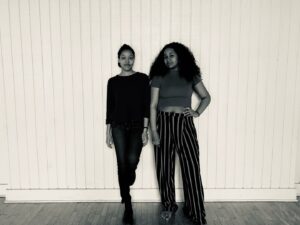
Nia Farrell (left) and Talia Paulette Oliveras (right). Photo by Zoe Bloomfield.
This post was written by the author in their personal capacity.The opinions expressed in this article are the author’s own and do not reflect the view of The Theatre Times, their staff or collaborators.
This post was written by Lucas M. Kernan.
The views expressed here belong to the author and do not necessarily reflect our views and opinions.

